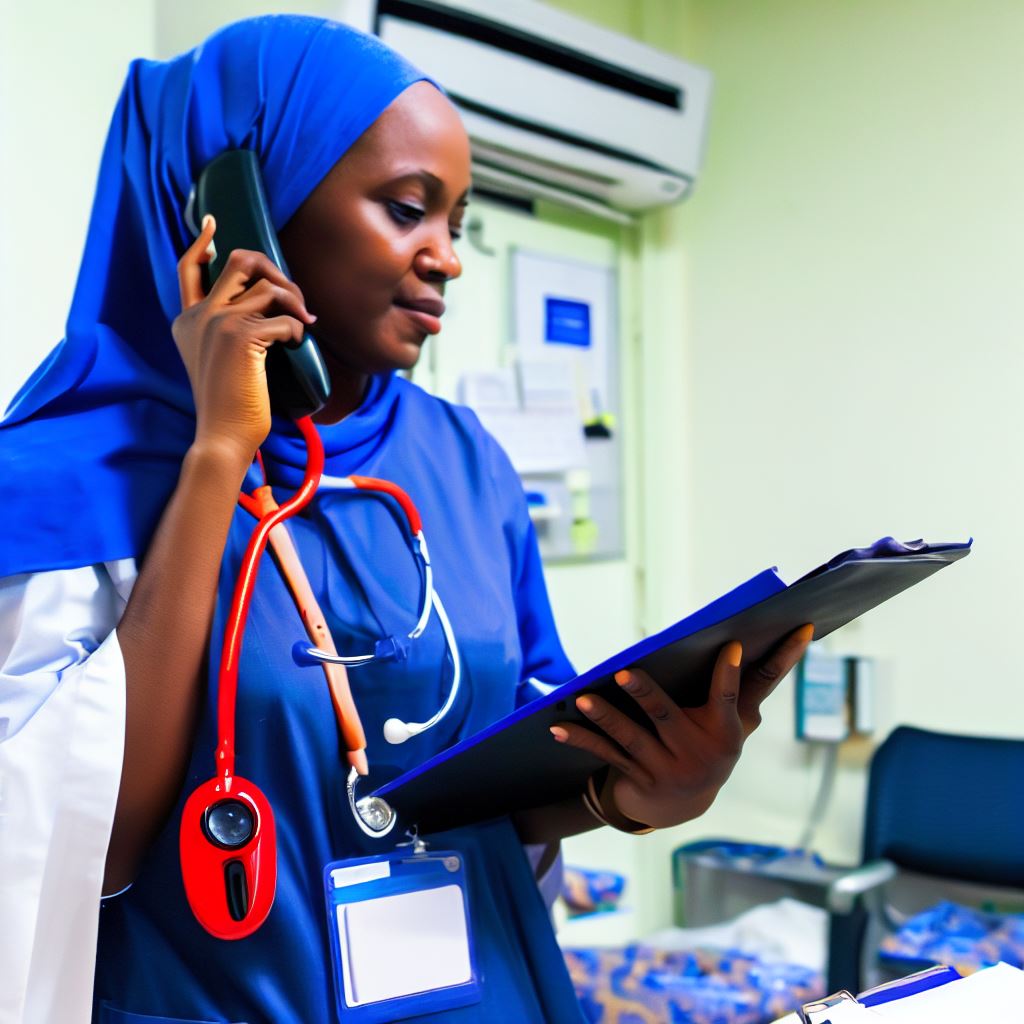Introduction
Let’s explore roles & responsibilities of medical secretaries in Nigeria.
Medical secretaries play a crucial role in healthcare by providing administrative support to medical professionals.
In Nigeria’s healthcare system, medical secretaries are of utmost importance for smooth functioning and effective patient care.
In the intricate tapestry of healthcare provision, medical secretaries stand as indispensable linchpins, orchestrating the seamless functioning of medical facilities across Nigeria.
Their multifaceted roles encompass a wide array of administrative tasks that are vital to the efficient operation of clinics, hospitals, and healthcare centers.
This comprehensive overview delves into the pivotal roles and responsibilities shouldered by these professionals, illuminating the crucial contributions they make to the Nigerian healthcare landscape.
From managing patient records to facilitating communication between healthcare providers and ensuring the logistical flow of medical services, the significance of medical secretaries cannot be overstated.
This exploration aims to shed light on the dynamic and ever-evolving scope of their duties, underscoring their pivotal role in the delivery of quality healthcare services in Nigeria.
Education and Training
Required education level for medical secretaries in Nigeria
High school diploma or equivalent is the minimum educational requirement for medical secretaries in Nigeria.
Some employers may prefer candidates with post-secondary education, such as a certificate or diploma in office administration or medical secretarial studies.
Specialized training in medical terminology, billing systems, and record-keeping is also beneficial.
Training programs and certifications available
Various training programs and courses are available for individuals aspiring to become medical secretaries in Nigeria.
These programs provide comprehensive training in office administration, medical terminology, healthcare systems, and computer skills.
Upon completion, individuals can obtain certifications such as Certified Medical Secretary (CMS) or Certified Professional Secretary (CPS).
Continuing education opportunities
Medical secretaries in Nigeria have access to numerous continuing education opportunities to enhance their skills and knowledge.
Professional associations and organizations offer workshops, seminars, and online courses on topics like medical coding, electronic health records, and communication skills.
Continuing education helps medical secretaries stay updated with industry trends and advancements in technology.
It also demonstrates a commitment to professional development and can lead to career advancement opportunities.
Read: Opportunities for Women in Lighting Technology in Nigeria
Administrative Duties
Medical secretaries in Nigeria play a crucial role in ensuring the smooth functioning of healthcare facilities.
Besides providing administrative support, they also assist in managing patient records and digital documentation, handling correspondence and telephone inquiries, as well as maintaining office supplies and equipment inventory.
Let’s explore these administrative duties in more detail:
Scheduling appointments for patients and healthcare professionals
One of the primary responsibilities of medical secretaries is to schedule appointments for patients and healthcare professionals.
This includes managing the appointment calendar, coordinating with doctors, nurses, and other staff members, and ensuring that appointments are properly scheduled and organized.
Medical secretaries must also handle rescheduling or cancellations, ensuring that patients are notified promptly.
Managing patient records and digital documentation
Medical secretaries are responsible for managing patient records and digital documentation to maintain an organized and efficient system.
This includes updating patient information, managing medical histories, and ensuring confidentiality and security.
They must be well-versed in using electronic health record systems and other software applications to input, retrieve, and maintain accurate patient data.
Handling correspondence and telephone inquiries
Medical secretaries act as the main point of contact for correspondence and telephone inquiries in healthcare facilities.
They handle incoming calls, address patient concerns, and provide information about services and appointments.
Efficient communication and excellent customer service skills are essential for medical secretaries to ensure patients and other stakeholders have a positive experience.
Maintaining office supplies and equipment inventory
Medical secretaries are responsible for managing the inventory of office supplies and equipment.
They ensure that necessary supplies such as stationery, forms, and other materials are readily available.
They also coordinate with vendors for equipment maintenance and repairs, ensuring smooth operations and minimizing downtime.
In short, medical secretaries in Nigeria fulfill vital administrative duties to support the functioning of healthcare facilities.
From scheduling appointments and managing patient records to handling correspondence and maintaining office supplies, their contributions are integral to providing quality healthcare services.
With their efficient and organized work, medical secretaries play a crucial role in ensuring a streamlined and effective healthcare system in Nigeria.
Read: Networking Opportunities for Lighting Technicians in Nigeria
Patient Interaction and Coordination
Welcoming and assisting patients in a professional manner
Medical secretaries in Nigeria play a crucial role in ensuring a welcoming and professional atmosphere for patients.
They greet patients with a warm smile and assist them in a friendly and helpful manner.
By providing a positive first impression, medical secretaries create a comfortable environment for patients.
They ensure the waiting area is clean and well-organized, making patients feel valued and respected.
Medical secretaries also respond to patients’ inquiries, providing accurate and relevant information.
They strive to address any concerns or anxieties patients may have, demonstrating empathy and understanding.
By being attentive and compassionate, medical secretaries establish trust and rapport with patients.
Managing patient registration process
Medical secretaries are responsible for managing the patient registration process efficiently.
They collect and verify patients’ personal and medical information accurately.
By ensuring all necessary forms are completed, medical secretaries contribute to smooth operations.
They maintain confidentiality and privacy while handling sensitive patient data.
Medical secretaries update patient records and ensure they are well-organized and easily accessible.
They coordinate with healthcare providers to retrieve and update medical history and test results.
Coordinating referrals to other healthcare providers
Medical secretaries play a vital role in coordinating referrals for patients requiring specialized care.
They communicate with healthcare providers to gather necessary information for referrals.
By ensuring accurate and timely communication, they facilitate seamless transitions in patient care.
Medical secretaries schedule appointments with other healthcare providers and provide necessary documentation.
They follow up with patients to ensure they receive the required specialist care.
Ensuring patient confidentiality and privacy
Confidentiality and privacy are paramount in the healthcare industry, and medical secretaries uphold these principles.
They strictly adhere to legal and ethical guidelines to safeguard patients’ personal and medical information.
Medical secretaries maintain secure electronic and physical filing systems for patient records.
They only share information with authorized healthcare providers involved in the patient’s care.
Medical secretaries implement privacy measures, such as password protection and restricted access to records.
They educate patients about their rights and responsibilities regarding the confidentiality of their information.
In fact, medical secretaries in Nigeria excel in patient interaction and coordination.
They welcome and assist patients professionally, manage the registration process efficiently, coordinate referrals, and ensure patient confidentiality and privacy.
Their dedication and commitment contribute to a positive patient experience and successful healthcare delivery in Nigeria.
Read: The Importance of Lighting Technicians in Nigerian Events
Medical Knowledge and Terminology
Familiarity with medical terminology, procedures, and diagnoses
Medical secretaries in Nigeria need to have a strong understanding of medical terms.
They must be familiar with common medical procedures and diagnoses used in healthcare settings.
This knowledge allows them to communicate effectively with healthcare professionals.
Understanding medical coding and billing processes
Medical secretaries in Nigeria should have a good grasp of medical coding and billing processes.
They need to understand how to assign the correct codes to different medical procedures.
This ensures accurate billing and helps healthcare facilities maintain financial stability.
Ability to handle medical-related inquiries from patients
Medical secretaries in Nigeria play a crucial role in handling patients’ medical inquiries.
They should have the knowledge to provide accurate information about various medical conditions.
This requires them to stay updated on medical advancements and research.
In essence, medical secretaries in Nigeria need to possess a strong medical knowledge and familiarity with medical terminology, procedures, diagnoses, as well as coding and billing processes.
Their ability to handle medical-related inquiries from patients is vital in providing accurate information and ensuring effective communication within healthcare settings.
Read: Certifications and Training for Lighting Technicians in Nigeria

Insurance Claims and Billing
Insurance claims and billing play a crucial role in the daily tasks of medical secretaries in Nigeria.
Medical secretaries are responsible for ensuring that patients have adequate insurance coverage and understanding the requirements and payments associated with their insurance policies.
In this section, we will explore the role of medical secretaries in handling insurance claims and billing.
Verifying patient insurance coverage and eligibility
One of the primary responsibilities of medical secretaries is to verify the insurance coverage and eligibility of patients.
This involves collecting and reviewing insurance information provided by patients and contacting insurance providers to confirm the details.
Medical secretaries must ensure that patients have active insurance coverage before scheduling appointments or providing medical services.
Processing insurance claims and following up with providers
Medical secretaries are also responsible for processing insurance claims on behalf of patients.
They gather all the necessary medical procedure and diagnosis codes and submit the claims to the appropriate insurance providers.
After the claims are submitted, medical secretaries follow up with the providers to ensure timely reimbursement.
Publish Your Professional Profile, Business or Brand
Showcase your expertise, gain trust, and boost visibility instantly on Professions.ng.
Publish NowThey track the progress of claims, address any issues or rejections, and work towards resolving them to ensure payment for medical services rendered.
Assisting patients with understanding insurance requirements and payments
Another important task of medical secretaries is to assist patients in understanding insurance requirements and payments.
This involves explaining insurance policies, coverage limitations, copayments, deductibles, and any other financial obligations.
Medical secretaries help patients navigate through complex insurance terminology and documents to ensure they have a clear understanding of their financial responsibilities.
Furthermore, medical secretaries provide guidance on the appropriate documentation and processes required to receive insurance reimbursements.
They educate patients on the importance of providing accurate and complete information to avoid claim denials or delays in payment.
By assisting patients in understanding insurance requirements, medical secretaries contribute to promoting transparency and improving patient satisfaction.
In general, medical secretaries in Nigeria have essential roles and responsibilities in handling insurance claims and billing.
They ensure patients have valid insurance coverage, process claims accurately, and follow up with providers for prompt reimbursement.
They also assist patients in understanding insurance requirements, promoting transparency, and reducing confusion regarding insurance payments.
The efficient management of insurance claims and billing by medical secretaries is crucial in providing quality healthcare services in Nigeria.
Organizational Skills and Multitasking
A medical secretary in Nigeria plays a crucial role in ensuring smooth operations within a healthcare setting.
Apart from handling administrative tasks, they also need to possess strong organizational skills and the ability to multitask efficiently.
In this section, we will explore the various aspects of organizational skills and multitasking in the role of medical secretaries.
Managing multiple tasks and priorities efficiently
Medical secretaries in Nigeria are expected to handle numerous tasks simultaneously.
They must effectively prioritize their tasks based on urgency and importance.
Efficient time management is essential to ensure all tasks are completed promptly.
Handling various responsibilities requires the ability to stay focused and organized.
By managing multiple tasks efficiently, medical secretaries contribute to the smooth workflow in healthcare facilities.
Coordinating appointments and resource allocation
One of the essential responsibilities of medical secretaries is appointment coordination.
They need to schedule appointments for patients and ensure they are properly allocated.
Coordinating with healthcare professionals, patients, and other staff members is crucial.
Efficiently managing appointments helps avoid confusion and ensures timely patient care.
Resource allocation also falls under the purview of medical secretaries.
They need to allocate resources such as medical equipment, rooms, and personnel efficiently.
Proper coordination and allocation contribute to a well-managed healthcare environment.
Attention to detail in documentation and record-keeping
Accurate documentation and record-keeping are critical aspects of a medical secretary’s role.
They need to pay meticulous attention to detail when recording patient information.
Ensuring accurate data entry and maintaining organized records are essential.
Medical secretaries must follow established protocols for maintaining confidentiality and privacy.
They play a significant role in maintaining accurate and up-to-date medical records.
Attention to detail minimizes errors and facilitates efficient retrieval of patient information.
In brief, organizational skills and multitasking are essential for medical secretaries in Nigeria.
Managing multiple tasks and priorities efficiently, coordinating appointments and resource allocation, and paying attention to detail in documentation and record-keeping are crucial aspects of their role.
By honing their organizational skills and embracing multitasking, medical secretaries contribute to the smooth functioning of healthcare facilities, ensuring quality patient care and operational efficiency.
Communication and Interpersonal Skills
Effective communication with patients and healthcare professionals
Medical secretaries play a crucial role in providing effective communication between patients and healthcare professionals.
They must possess excellent verbal and written communication skills to convey information clearly and accurately.
Medical secretaries must ensure that patients understand the instructions given by healthcare professionals.
They communicate test results, appointment details, and medical information to patients in a compassionate and understandable manner.
Clear communication helps to build trust, reduce anxiety, and enhance the overall patient experience.
Medical secretaries also communicate with healthcare professionals to coordinate patient care and ensure smooth operations.
They relay important messages, schedule appointments, and manage medical records efficiently.
Through effective communication, medical secretaries facilitate seamless collaboration within the healthcare team.
Strong interpersonal skills for team collaboration
Medical secretaries must possess strong interpersonal skills to foster teamwork and collaboration.
They interact with physicians, nurses, and other healthcare professionals on a daily basis.
By establishing positive relationships, medical secretaries contribute to a harmonious work environment.
They demonstrate respect, empathy, and professionalism while interacting with colleagues.
Strong interpersonal skills enable medical secretaries to handle conflicts and resolve issues effectively.
They actively listen, provide support, and offer assistance to their team members when needed.
Medical secretaries act as a bridge between different departments, ensuring smooth communication and cooperation.
Open and effective interpersonal skills enhance the efficiency and effectiveness of healthcare teams.
Dealing with challenging situations professionally
Medical secretaries often encounter challenging situations in their role and must handle them professionally.
They remain calm and composed when faced with difficult or irate patients.
By practicing active listening, medical secretaries empathize with patients’ concerns and address them appropriately.
They maintain confidentiality and handle sensitive information with utmost care and discretion.
Dealing with challenging situations requires medical secretaries to adapt to different personalities and maintain professionalism.
They understand the importance of patience, diplomacy, and tactfulness in handling sensitive matters.
Medical secretaries are trained to handle medical emergencies and crises, ensuring a quick and efficient response.
Professionalism in challenging situations strengthens the trust and confidence patients have in the healthcare system.
In review, effective communication and strong interpersonal skills are essential for medical secretaries in Nigeria.
They play a pivotal role in facilitating communication between patients and healthcare professionals, ensuring clear understanding and trust.
Additionally, their interpersonal skills contribute to team collaboration and a harmonious work environment.
Lastly, medical secretaries must handle challenging situations professionally, maintaining confidentiality and displaying patience.
By honing these skills, medical secretaries are vital assets to the healthcare system in Nigeria.
Technological Proficiency
A medical secretary in Nigeria needs to possess a strong knowledge of computer applications and software to effectively perform their duties.
They must be skilled in using various computer programs and applications required for administrative tasks.
To efficiently manage patient records and information, medical secretaries should be proficient in operating electronic health record (EHR) systems.
This involves entering and updating patient data, scheduling appointments, and managing medical records electronically.
Additionally, medical secretaries in Nigeria must constantly keep up with advancements in technology in the medical field.
This includes staying updated with new electronic systems, software, and tools used in healthcare settings.
Knowledge of computer applications and software
Medical secretaries should have a strong command of various computer applications and software, including:
- Word processing software for creating and formatting documents.
- Spreadsheets for organizing and analyzing data, such as patient records and financial information.
- Database management systems to maintain and update patient information.
- Email and communication software for efficient correspondence with healthcare professionals, patients, and other staff members.
- Scheduling software to manage appointments, meetings, and events.
- Medical billing software for managing invoices, insurance claims, and financial transactions.
Operating electronic health records (EHR) systems
Medical secretaries should be well-versed in operating electronic health record (EHR) systems, which enable the digitization and organization of patient information. This involves:
- Entering and updating patient demographics, medical history, and treatment records.
- Managing appointments, scheduling, and sending automated reminders to patients.
- Generating reports and extracting data for analysis and decision-making.
- Collaborating with healthcare professionals to ensure accurate and up-to-date patient records.
- Ensuring data privacy and security in accordance with applicable regulations and policies.
Keeping up with technology advancements in the medical field
Medical secretaries should strive to stay current with technology advancements in the medical field.
This involves:
- Participating in training programs and workshops to enhance technical skills.
- Attending conferences and seminars related to medical technology and informatics.
- Exploring new software and tools that can improve administrative tasks and overall efficiency.
- Networking with colleagues and professionals to share knowledge and experiences.
- Adapting to changes in technology, regulations, and best practices within the medical field.
Basically, technological proficiency is an essential aspect of a medical secretary’s role in Nigeria.
Being knowledgeable in computer applications and software, operating electronic health record systems, and keeping up with technology advancements are key responsibilities for efficient and effective administrative support in healthcare settings.
Conclusion
The roles and responsibilities of medical secretaries in Nigeria
- Managing patient records, appointments, and medical histories.
- Handling administrative tasks, such as billing, coding, and insurance claims.
- Assisting medical professionals with administrative support during patient consultations.
- Ensuring the smooth operation of the healthcare facility by coordinating schedules and resources.
- Providing excellent customer service and patient care.
The importance of their contributions to the healthcare system
- Efficiently managing patient information, which improves the accuracy and quality of care.
- Facilitating effective communication and collaboration among healthcare providers.
- Ensuring compliance with legal and ethical standards in healthcare administration.
- Streamlining administrative processes, reducing costs, and optimizing resources.
Encouragement for aspiring medical secretaries in Nigeria
For those considering a career as medical secretaries, Nigeria offers numerous opportunities for growth and professional development.
Aspiring medical secretaries should acquire relevant skills, such as proficiency in software and medical terminology.
Continuous learning and staying updated with emerging trends in healthcare administration is vital for success.
The role of a medical secretary is crucial in providing efficient and seamless healthcare services to the Nigerian population.
By pursuing this career, aspiring medical secretaries contribute significantly to the healthcare system’s success while enjoying personal fulfillment and job satisfaction.




